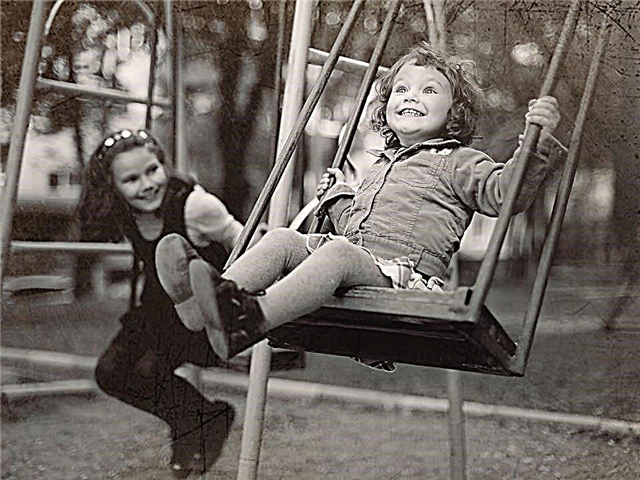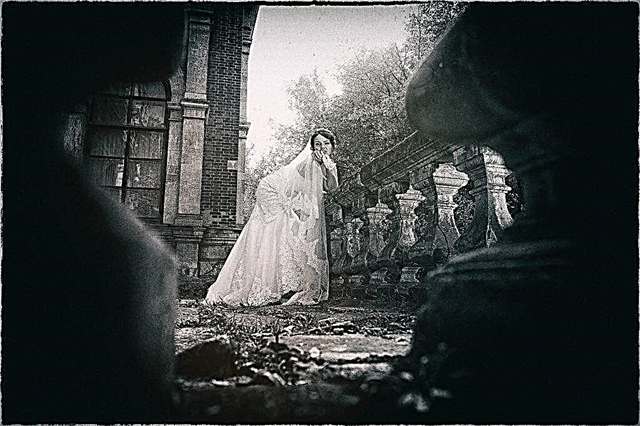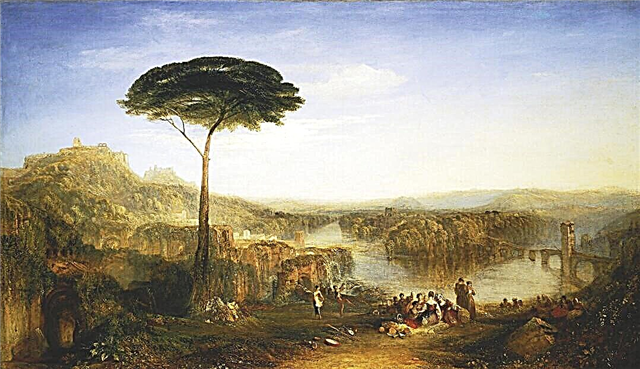In advance notice, the author writes that all of his characters are fictitious and he would like his work to be read as “a fantastic story, where the clouds floating over Essex were reflected, but not even an inch of his land was captured”.
In one of the towns of New England, on the street that everyone calls Pinchenova, there is an old Pinchenov house - a large wooden house with seven gables. The first to settle in this place was Matthew Mol, but when the village grew, his plot was liked by Colonel Pinchen, and the colonel got the deed of authority on these lands. Matthew Maul did not give up, and the lawsuit lasted until the death of Maul, who was executed on charges of witchcraft. According to rumors, before his death, Matthew Mol loudly declared that he was being led to death because of the land, and cursed Pinchen. Having taken possession of the Mol site, Pinchen decided to build a family mansion with seven gables on the site of his hut. Oddly enough, the son of old Matthew Moll led the construction and did his job honestly - the house was built spacious and strong. After the construction was completed, the colonel invited the whole city to his house, but, to everyone's surprise, he did not go out to meet the guests. When the guests, led by the governor, entered the house, they saw that the colonel was sitting in a chair under his own portrait, dead.
The mysterious death of the colonel gave rise to many rumors, but nothing indicated that she was violent. And yet, the people have the opinion that a curse weighs on the house. The colonel claimed the vast eastern lands, but documents confirming his right to them were not found, so the heirs had to be content only with the former Pincheni possessions. According to rumors, in every generation of Pinchenov there was at least one Pinchen, who inherited the cruelty, insight and vigorous grip that distinguished the old colonel. About a hundred years ago, one of them died under circumstances very reminiscent of the sudden death of the colonel, which further strengthened the people in the opinion that a curse was burdening the Pinchenov clan. Thirty years ago, one of the Pincheni is said to have been killed by his nephew. True, either due to a lack of evidence, or due to the accused’s nobility, the death penalty was replaced by life imprisonment, and there have recently been rumors that the prisoner will soon be released from prison. The murdered Pinchen was an old bachelor who came to the conclusion that Matthew Mol was not to blame, and wanted to return the House of the Seven Gables to his descendants. Relatives opposed this, but feared that the old man would not bequeath to him Molam; their fears were not confirmed - family feelings prevailed, and the old man bequeathed all his property to another nephew, the cousin of his killer. The heir, formerly a great hanger, has reclaimed and has become a highly respected person. He studied law and became a judge. Judge Pinchen built a big house for himself and even called on his sister-killer cousin's sister Gefsibu Pinchen to live, but the proud old maid did not take alms from his hands and lived in the House of seven gables in deep poverty, communicating only with the daguerreotypist Holgrave, whom she allowed to live to the far wing of the house, so as not to feel so alone, and with Uncle Venner, the kindest old craftsman who likes to philosophize at his leisure.
Having stood for one and a half years, the house resembled "a huge human heart, which lived an independent life and had a memory, where the good and the bad mixed." One of the features of this house was a strange door, divided in two horizontally and equipped with a viewing window. It was the door of a small shop, which about a hundred years ago was cut by the then owner of the house, who was in straitened circumstances and did not find a better way to improve his affairs, how to open a shop directly in the family home. Now Gefsiba, having no means of livelihood, with a pain in her heart decided to follow in the footsteps of her little respectable ancestor and reopen the petty shop. Burning with shame, she lets in the first buyer - a neighbor's boy, but still can not take money from him and gives him the carrot for free. Buyers do not really favor Gefsiba's shop - the old maid seems very scary and inhospitable to them, although in fact she does not frown, but simply looks carefully with her short-sighted eyes. After the first working day, only a few coppers are recruited in her box.
But in the evening in front of the House about seven gables an omnibus stops and a young girl comes out of it - a relative of Gefsiba Phoebe, who came from the village. At first, Gethsibah was not very happy with the unexpected guest, but gradually softened, especially since Phoebe was economical, hardworking and flexible. She begins to trade in the shop, and things immediately go uphill. Phoebe meets Holgrave and wonders how well he cares for the garden. Holgrave shows her a daguerreotype portrait of Judge Pinchen, like two drops of water similar to the portrait of Colonel Pinchen hanging in the living room. One night, Phoebe hears rustling and voices, and in the morning Gefsiba introduces her to her brother Clifford - the one who was accused of killing his uncle and spent thirty years in prison. Gefsiba had been waiting for her brother all this time, keeping his miniature portrait and not believing in his guilt.
Clifford returned with an old man, broken, with a shaky mind, and Gefsib and Phoebe surround him with tender care. Clifford asks to remove the portrait of Colonel Pinchen, considering him to be the evil genius of the house and his own, but Gefsiba thinks that she does not have the right to do this, and confines herself to covering him with a curtain. Judge Pinchen comes into the shop and, having learned that they are relatives, wants to kiss the girl, but she involuntarily recoils, recognizing in him the original daguerreotype portrait shown to her by Holgrave. After knowing that Clifford is back, the judge wants to see him, but Gefsiba does not let him in. The judge invites her, together with Clifford, to move to his country house and live there without worries and troubles, but Ghefsiba resolutely refuses. Holgrave, to whom Phoebe at first is incredulous for his disrespect for the laws, is gradually gaining her favor. At twenty-two, he had already traveled along and across New England, traveled to Europe and tried a bunch of activities - he served as a clerk in a village shop, taught in a rural school, and lectured on Mesmer magnetism. For him, the House of the Seven Gables is the embodiment of the disgusting Past with all its bad influences, and he lives here temporarily and only in order to better learn to hate this past.
He is a writer and reads Phoebe his story about Alice Pinchen: “Once the Hon. Gervaise Pinchen summoned the young Matthew Moll, the grandson of the sorcerer and the son of the builder of the House about seven gables. It was rumored that the Mols knew where the document was stored, giving the Pinchenes the right to own vast eastern lands, and Gervaise Pinchen promised Matthew Mola a generous reward if he could help him find this document. In exchange for help, Maul demanded that his grandfather's land be returned to him along with the House on the Seven Gables. Pinchen was indignant at first, but, thinking, agreed. Matthew Maul said he could find papers only if Pinchen’s daughter, beautiful Alice, helped him. The pier put Alice to sleep and forced her to obey her will. He wanted to use her soul as a telescopic shell to look into the other world with his help. He managed to enter into communication with the participants in the old lawsuit, but could not find out the secret: when the old colonel wanted to open it, they gagged him. Maul realized that, as a punishment for sins, the colonel would have to remain silent until the document lost its power - so that the heirs of the riches he did not see. Thus, the House of the seven gables remained with the Pincheni, but Alice’s soul fell into the power of Matthew Maul, who doomed her to a slow, shameful mockery. Unable to bear the humiliation, Alice soon died, and was not darker and more sad than the man who was walking behind the coffin than Matthew Mol, who wanted to teach her pride, but did not want her to die. ”
Reading his story, Holgrave noticed that Phoebe fell into a strange daze. It seemed that he could take possession of her soul in the same way as the carpenter Matthew Mol had once been — the soul of Alice, but Holgrave did not do this and simply woke Phoebe, who seemed to have all Alice’s troubles to happen to herself. Phoebe leaves for a few days in the village with her relatives: after living in the House of seven gables for only a month and a half, she became so attached to its inhabitants that she did not want to leave them for long. During her absence, Judge Pinchen comes to Gefsiba again. He is confident that Clifford knows family secrets that provide the key to unheard of wealth. If Clifford doesn’t open it, he threatens to put him in a madhouse, and Gefsib reluctantly follows her brother. She is very afraid of meeting Clifford with Judge Pinchen: knowing her brother’s vulnerable soul, she worries about his already weak mind. But Clifford's room is empty. Frightened, Getfsiba returns to the drawing room and sees a judge sitting motionless in a chair. On the threshold of the living room stands the joyful Clifford. Gefsiba does not understand what happened, but feels that something terrible has happened. Clifford leads her out of the house, and she spontaneously follows him to the train station, where they board the train and travel to an unknown destination.
The next morning, residents of Pinchenova Street are surprised at the disappearance of two helpless old people, but there is a rumor that Judge Pinchen was killed, and rumor has it that he attributes this crime to Clifford and Gefsiba. Returning from the village, Phoebe finds only Holgrave in the house, who informs her that Judge Pinchen is dead, and Clifford and Gefsiba have disappeared. Holgrave does not know what happened, but he, like Phoebe, is confident in the innocence of the old people. Holgrave suggests that, shocked by the similarity of the death of Judge Pinchen with the death of a bachelor - his uncle, who had such devastating consequences for Clifford, the old men fled in fear, and is afraid that this will lead to them being suspected of murder.
Fortunately, Clifford and Gefsiba are returning, and Phoebe and Holgrave, who have already managed to confess their love to each other, joyfully meet them. The medical report confirms that the judge died his death and no one killed him. Moreover, it turns out that no one killed both Clifford's uncle and Judge Pinchen. Judge Pincheng, who was a racket and a moot at that time, lost his uncle's disposition, and he rewrote his spiritual testament in favor of Clifford. One night, the nephew's rake climbed into Uncle's cache and was caught red-handed. The old bachelor was seized with an apoplexy blow, to which he, like all the Pincheni, had a hereditary predisposition, and his nephew destroyed the new will and left the old secretary, according to which all his uncle’s property went to him. Initially, he was not going to blame Clifford for the murder, but when the case took a disastrous turn for Clifford, he kept silent about what really happened and did not intercede for his cousin. Fate cruelly punished Judge Pinchen: his only son unexpectedly died of cholera. Thus, Clifford, Gethsib and Phoebe turned out to be the heirs of the judge.
Having received the inheritance, they decide to move to the country house of Judge Pinchen. Before leaving, they gather in the living room of the House about seven gables. Looking at the portrait of the colonel and as if cringing under his stern gaze, Clifford feels like in him some vague childhood memory comes to life. Holgrave tells him that he probably knew where the hidden spring was to open the cache. Indeed, Clifford recalls how one day he accidentally stumbled upon her. Previously, when you clicked on it, the portrait was lifted, but now the mechanical device is rusted, and when Holgrave presses it, the portrait with the frame breaks off the wall and falls to the floor. A recess opens in the wall where an old parchment rests, claiming the exclusive right to own vast eastern lands for Colonel Pinchen and his descendants. “This is the very parchment, the search for which cost the life and happiness to the beautiful Alice,” says the daguerreotype, hinting at his composition. It was this document that Judge Pinchen was looking for, to whom Clifford had once told about his find. Now it’s just a piece of old skin that has no legal effect. Phoebe wonders how Holgrave knows all this, and the young man admits that his real name is Mol. The son of the executed Matthew Maul, building the House of the Seven Gables, made a hollow in the wall and hid a document there confirming the Pinchen's right to the eastern lands. So, because of the unfairly appropriated garden of Matthew Moll, the Pincheni lost several thousand acres of eastern land. Some time later, a carriage drives up to the House of Seven Gables and takes its inhabitants to a new house. They even take Uncle Wenner with them to settle him in a cozy little house in their new garden.



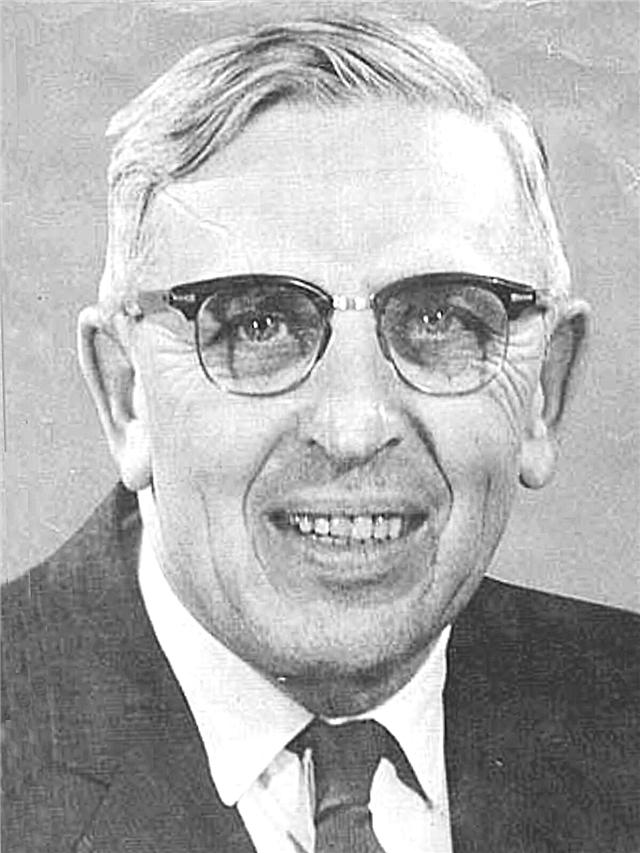
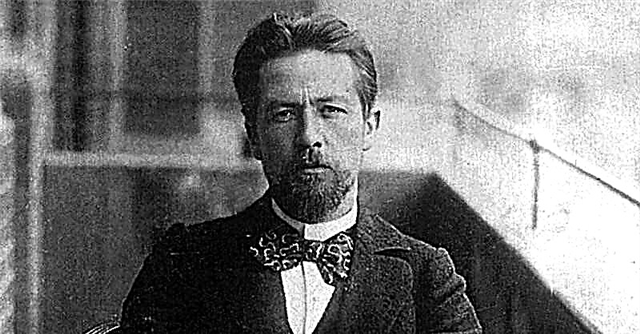
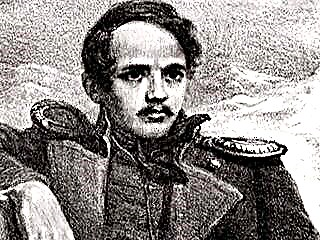

 twelfth Night
twelfth Night
